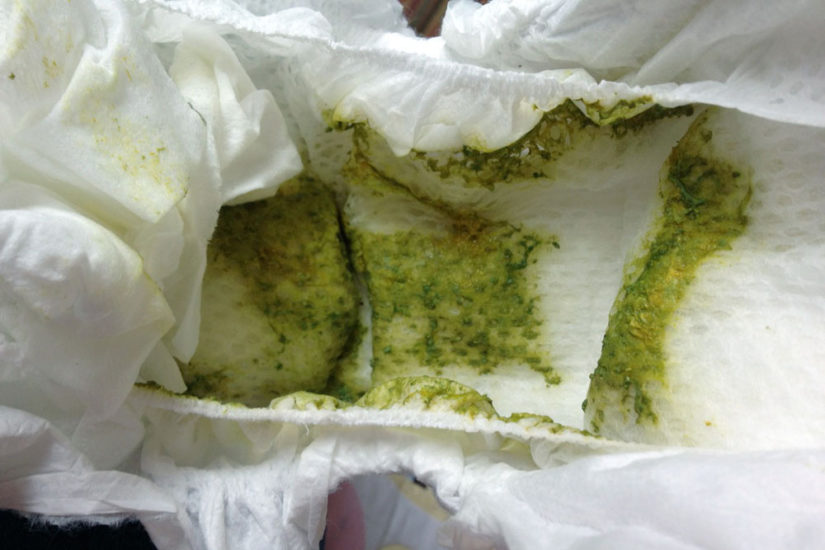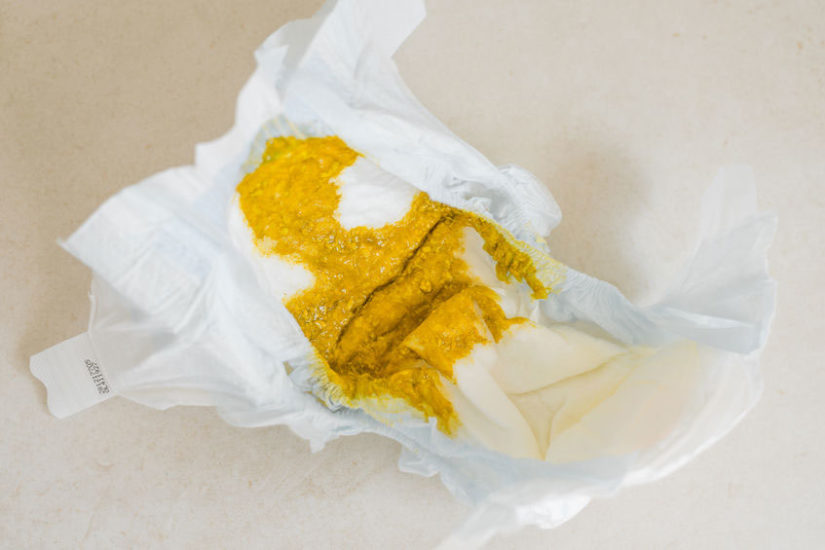The usual colour of a breastfed baby’s poo is mustard or yellow. Plenty of soft yellow poop after day five of life shows your baby is drinking plenty of breast milk—see Breastfed Baby Poop for a review of what to expect in your baby’s nappy in the early weeks. A green poo on day three of life is normal. Later, an occasional green poo is not unusual, but what about frequent green nappies? What do they mean?
Why is my baby’s poop green?
There are several possible causes for green poo:
#1 Green poop may be normal for your baby
If your baby frequently has green poo or yellowy green poo but is gaining weight well and is happy and content, it may just be normal for your baby. Dr Jack Newman a Canadian paediatrician and breastfeeding specialist explains:
If the baby is content, gaining well and drinking well and the only problem is that the baby has green bowel movements, the mother should wear sunglasses so she can’t tell what colour they are and stop worrying about green bowel movements.
#2 Lactose overload
If your baby frequently has copious green poo, is gaining weight but is quite fussy or gassy, your baby could be showing signs of “lactose overload“. Lactose is the main sugar in breast milk. A lactose overload refers to a baby struggling to digest the volume of lactose before it passes through the bowel. There could be a number of reasons why the volume of lactose is temporarily overwhelming. It could happen after a tummy bug or if a mother has a very plentiful milk supply (oversupply) where the lactose in breast milk is coupled with a very high volume of the lower fat milk that comes at the start of a breastfeed. If it is difficult for a baby to digest the lactose properly this may cause frothy or foamy, watery, green stools. Occasionally a baby will not gain weight very well with lactose overload, despite a plentiful milk supply.
Check with a breastfeeding specialist
Discussing your baby’s history with an IBCLC lactation consultant can be useful if you suspect your baby has lactose overload as it can sometimes be confused with #3 Not enough milk or #4 An allergy to something in mother’s diet. Staying on one breast per feed or for a period of time (block feeding) can sometimes be helpful with true oversupply. As this can be a difficult topic to unpick see the following articles for much more information:
- Lactose Intolerance in Babies
- Oversupply of Breast Milk
- Milk Allergy in Babies
- Is My Baby getting Enough Milk?
- Baby Not Gaining Weight
- One Breast or Two per Feed
#3 Not enough milk
If your baby has scant green poo (not many dirty nappies and not much green poo in each nappy) this can indicate insufficient milk intake. If your baby is not getting enough milk, he may be fussy and tense—sometimes wanting to feed “all day” or he may be very sleepy and he will not be gaining much weight. An IBCLC lactation consultant can help you devise a plan to increase your milk supply and ensure your baby is getting enough milk. It’s important not to block feed (keeping to one breast per feed or a period of time) in this situation unless on the advice of a breastfeeding specialist who has taken a full history and studied your baby’s weight chart. Staying on one breast “to reach the hindmilk” is a way to reduce your milk supply, see Forget About Foremilk and Hindmilk.
the frequent scant green nappy of a baby not gaining weight is NOT the same as the copious frothy green nappy of a baby with lactose overload. Staying on one breast is not the answer for a baby with green “starvation stools”. See your IBCLC lactation consultant for further information if you are not sure what your baby’s nappies mean or whether block feeding is a good idea for your baby.
#4 An allergy to something in mother’s diet (or baby’s diet)
If your exclusively breastfed baby frequently has copious green poo and is quite fussy and difficult to settle he may have a sensitivity to something his mother has eaten such as cows’ milk products. This is more likely when a baby also has other symptoms such as eczema/rashes, colic symptoms, being snuffly, and having reflux. An allergic baby’s poop is usually very runny and can sometimes have large amounts of mucus or traces of blood in it. Some babies will have sore bottoms or nappy rash due to the acidic condition of the baby’s irritated bowel and they might have excess flatulence (farts!). Poop may be quite smelly compared to the usual sweet smelling poop of a breastfed baby. 1 You may find reading about milk allergy in babies and elimination diets helpful.
Formula supplements
Supplements from industrially made infant formula could also cause green stools either due to an intolerance or due to excess iron in formula.2
#5 A tummy upset
If your baby is poorly with a tummy upset or a cold or recovering from an intestinal illness this may cause green poo (check with your doctor).
#6 Jaundice?
The Womanly Art of Breastfeeding, 2010 p. 396 points out that babies having phototherapy for jaundice have plenty of green poop “the colour of creamed spinach” as the bilirubin is excreted.
#7 Something green in mother’s diet
If mother (or baby) has eaten a lot of green vegetables or something with green food colouring, baby’s nappies may be green to match. This may not be a concern unless your baby is also upset and fussy or seems to have tummy ache in which case chat with your breastfeeding specialist about whether to make changes to mum’s diet (and see #4 above). A mother taking a lot of fenugreek for her milk supply may notice her baby has green poop.
Something green in baby’s diet
An older baby might eat certain green foods himself that lead to green poo. In the book Baby Poop: What Your Pediatrician May Not Tell You author Linda Palmer shares that grape-flavoured Pedialyte (a hydration drink) may turn baby poo bright green and that iron supplements can turn stools dark green.
#8 Medications for mother or baby
Some antibiotics or other medications may cause poop to rush through the bowel more quickly causing green nappies. Many mothers have also reported sudden onset of green poop following a baby’s vaccinations (check with your doctors if you have any concerns). Author Robyn Noble says vaccination deserves consideration as a contributor to food allergies (#4) and that vaccinations are best not given to anyone with abnormal poop as this is a major sign of abnormal gut conditions and a sign that the immune system is already under stress3.
#9 Teething
Teething is sometimes reported to cause greening and loosening of poop which is thought to be connected to swallowing extra saliva (Palmer, 2015).
A note about old poop
According to Noble and Bovey, if your baby’s poop is not fresh but has been sitting in the nappy for a while, oxidation processes will make the poop look greener, so old stools may not be a reliable indicator of colour. 4
Summary
If you have any concerns about the colour of your baby’s poop or your baby’s health always check with your baby’s doctor or paediatrician. There are several possible reasons for a baby to have green poops and an IBCLC lactation consultant can be an important member of your health team to help identify any reasons that could be connected to breastfeeding.

